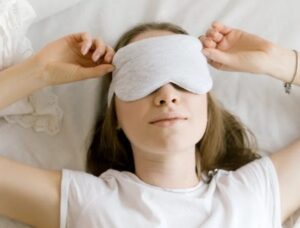New Delhi, March 15 – Exams are a period of acute stress, in fact from standard 8th to completion of graduation, there is a period of acute on chronic stress due to the number of exams which have to be given Some students get extremely stressed and some are able to cope well, remain healthy and perform well in their academics and career.
So what is it that actually helps the student to reach that potential?
One of the most important factors is sleep. Most of us do not count sleep as part of our health. In fact, it comes way down in the list of priorities. Most students pride themselves for not sleeping during the exams and for burning the midnight oil. A large chunk of this has been created by a false belief system stating that the student must revise the exam portion the previous day or maybe the student is not prepared and is trying to retain last minute preparations. For whatever may be the reason, a good night sleep not only the day before the exam but also 1 month prior to exam is essential.
Why is sleep necessary:
- Duration of sleep depends on age of individual with younger children requiring more sleep, but on average a good eight-nine hours of restful sleep is required for optimal functioning of the body
- Good sleep stabilises the hormones of the body namely blood sugar level , insulin level , cholesterol , leptin , ghrelin and cortisol levels of the body . These hormones are essential for proper functioning of the body
- Lack of sleep suppresses the leptin or the satiety hormone and activates ghrelin (hunger hormone). As a result of which, the individual develops excessive hunger and cravings and has more of sweet and salty food leading to weight gain.
- When blood sugar levels are not maintained and insulin level rises, there is increased incidence of developing prediabetes or diabetes at an early age, many of which may be missed.
- Lack of sleep increases cortisol level which causes inflammation in the body leading to repeated infections and decreased immunity. Appearing for exams in a sick state decreases performance and needs to be avoided
- Increased cortisol level also interferes with cognition and memory leading to poor recall, confusion, forgetfulness. All of this together creates anxiety, nervousness and stress creating a situation of fear in the mind of the student.

Hence, sleep is a very important component of health. Good sleep is the time when the cellular regeneration of body takes place helping all the organs and systems of the body to work in unison and in the best possible manner. This creates a healthy body with safe mental environment which is critical for growth, development and meeting all challenges of life including exams.
(Dr. Paula Goel, Consultant Pediatrician, Adolescent Physician and Founder of Fayth Clinic)
Do you know? Sleep masks can boost brain function says Study

Wearing an eye mask can potentially enhance cognitive functions of the brain as it blocks ambient light while we sleep, suggests a study.
Sleep is crucial for alertness and for preparing the human brain to encode new information. However, ambient light, like an outdoor street light shining through your window, can influence sleep structure and timing.
The study, published in the journal Sleep, showed that wearing an eye mask blocks light during night sleep and improves memory and alertness.
“Our findings suggest that wearing an eye mask during overnight sleep can improve episodic encoding and alertness the next day,” wrote Viviana Greco, from School of Psychology at University of Cardiff, along with other researchers in the paper.
The team conducted two experiments to understand how sleep masks help.
In the first experiment, 94 people in the age group of 18-35 wore an eye mask while they slept every night for a week and underwent a control condition in which light was not blocked for another week. Five habituation nights were followed by a cognitive battery on the sixth and seventh day.
This revealed superior episodic encoding and an improvement on alertness when using the mask, the researchers said.
In the second experiment, 35 people of the same age group used a wearable device to monitor sleep with and without the mask.
This replicated the encoding benefit and showed that it was predicted by time spent in slow-wave sleep.
Furthermore, the benefit to memory was predicted by the time spent in slow-wave sleep while wearing the mask.
This suggests wearing an eye mask during sleep is an effective, economical, and noninvasive behaviour that could benefit cognitive function and lead to measurable impacts on everyday life, the researchers said.











